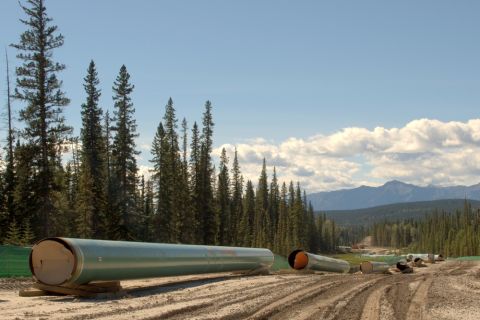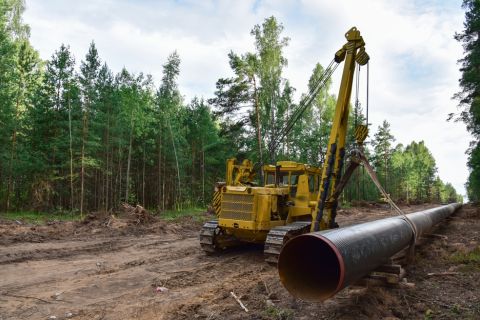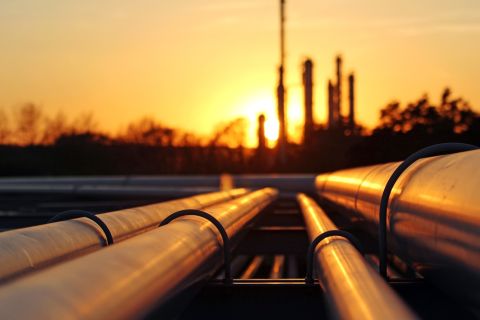
Import-dependent India is ramping up strategic oil reserves amid the aggressive acquisition of oil and gas assets abroad.
State-run Indian Strategic Petroleum Reserves Ltd. (ISPRL) is doubling the crude oil storage capacity to more than 43.32 million tons in a move to enhance energy security for the country that imports about 80% of its crude oil needs.
“ISPRL is setting up strategic crude oil reserves with storage capacity of 5.33 million metric tons (MMmt) at three locations – Visakhapatnam (1.33 MMmt), Mangalore (1.5 MMmt), and Padur (2.5 MMmt) – to enhance the energy security of the country,” Panabakka Laxmi, junior minister for petroleum and natural gas, told the Parliament.
The minister also said ISPRL is setting up four more storages with total capacity of 12.5 million tons in the wake of increasing dependence on crude oil imports, which is expected to surpass 90% by 2020. “In order to further increase the strategic crude oil storage capacity, ISPRL has undertaken a detailed feasibility study for construction of additional 12.5 MMmt of crude oil storages in Phase II at four locations – Bikaner, Rajkot, Chandikhol, and Padur."
The Bikaneer and Chandikhol projects are to be designed with storage capacity of 3.75 million tons each, while Rajkot and Padur will be developed with capacity of 2.5 million tons each. This plan would increase the country’s storage capacity to 43.32 million tons, up from the existing 25.49 million tons.
The company is developing the additional storage capacity in line with the country’s integrated energy policy, which has suggested building strategic crude oil storage equivalent to 90 days of net oil imports as buffer stock for emergency supplies. The storage capacity is planned on the basis of the country’s estimated net oil imports of 179.03 million tons by the fiscal 2019-2020 and the 90 days of oil imports of that comes to around 44 million tons.
Underground Caverns
ISPRL has already begun construction work for the Visakhapatnam, Mangalore, and Padur projects. Engineers India Ltd. has been named project consultant for the development of these projects.
The company is developing storage in a hill with maximum elevation of 130 m (427 ft) above mean sea level at Dolphin Nose, southwest of Visakhapatnam Port. The underground cavern facility consists of two storage units, with a capacity of 1.33 million tons, for storage of high- and low-sulphur crude in a ratio of approximately 70:30. The first storage unit is designed with three legs with length of 820 m (2,690 ft) and the second storage unit with two legs of 320 m (1,050 ft). The caverns will be approximately 20 m (66 ft) wide with a maximum height of around 30 m (98 ft).
The Mangalore cavern is coming up in a hill named Kalvar Padavu, approximately 15 km (9 miles) from Mangalore Port. It will comprise two separate, but identical, underground storage, each about 900 m (2,953 ft) long, having a total capacity of 1.5 million tons of crude oil. Two types of crude in the ratio of 50:50 will be stored.
The Padur facility is being developed in a hill at Padur village in Udipi district of Karnataka. The storage facility would consist of two units for storage of two types of crude in a ratio of approximately 75:25. The first storage unit will have six legs and the second storage unit shall have two legs with a length of approximately 700 m (2,297 ft). The caverns will be approximately 20 m (66 ft) wide with a maximum height of around 30 m (98 ft).
ISPL would lay a separate pipeline from Mangalore Port to storage units at Mangalore and Padur to source crude from overseas suppliers.
“These projects are expected to be commissioned progressively from early 2014 onwards,” a petroleum ministry official said.
In addition, ISPR is working on developing four more strateigc oil reserves – Bikaneer (Rajsthan), Chandikhol (Odisha), Rajkot( Gujarat), and Padur (Karnataka) – with a total capacity of 12.5 million tons. The storage at Chandikhol (3.75 million tons) and Padur (2.5 million tons) would be rock-cavern type, while Bikaneer and Rajkot are to be salt and concrete cavern, respectively.
EIL, the project consultant for the four proposed projects, has teamed with Germany-based DEEP Underground Engineering as a backup consultant for the for Bikaner salt cavern storage project and South Africa's Thomson Van Eck International (Pty) Ltd. for the Rajkot concrete cavern project.
Energy Security
The moves are being taken to deal with disruption of crude oil imports and an increase in global oil prices.
The country’s Integrated Energy Policy (IEP), approved by the Indian government in 2008, suggested a crude oil storage equivalent to 90 days of oil imports for strategic buffer stock purposes.
IEP states that the country’s growing dependence on energy imports exposes it to external dangers of supply disruption and price shocks.
“To deal with a contingency arising out of sudden disruption in the supply of crude oil, the country needs to develop strategic reserves of crude oil,” the IEP said. “While the economic costs of constructing strategic reserves are high, such reserves could be the most effective means for minimizing the economic costs of interrupted supplies and high oil prices.”
The acquisition of oil and gas assets abroad and development of oil reserves within the country would enhance energy security for India, the report added.
India is the fourth largest energy consumer in the world, after China, the US, and Russia. It depends largely on crude oil imports to meet the country’s demand for petro products. The dependence on crude oil imports has been increasing over the years due to stagnant domestic petroleum production and rising demand for oil and gas. Crude oil imports currently account for about 75% and is expected to reach 90% by 2020.
Despite the recent diversification of crude oil import sources, India still imports about 64% of its crude oil needs from the Middle East, a region known for geopolitical tensions. Volatility in the region could impact the crude oil supply chain. The US-Iran spat and the latter’s threat to impose a naval blockade in Strait of Hormuz could disrupt crude oil supplies to India. The recent upheaval in Libya and Tunisia already has disrupted crude oil supplies from north African states to the south Asian state.
Such issues have made developing strategic oil reserves a necessity for India to handle any supply disruptions.
“In view of the country’s high dependence on imported crude oil, volatility of oil prices in the international market as well as perpetual political instability in some of the major oil exporting nations/regions, it is imperative to ensure uninterrupted supply of crude oil to our country’s large and well spread out chain of refineries throughout the year,” a parliament petroleum committee said in a report.
Recommended Reading
Imperial Expects TMX to Tighten Differentials, Raise Heavy Crude Prices
2024-02-06 - Imperial Oil expects the completion of the Trans Mountain Pipeline expansion to tighten WCS and WTI light and heavy oil differentials and boost its access to more lucrative markets in 2024.
Trans Mountain Pipeline Announces Delay for Technical Issues
2024-01-29 - The Canadian company says it is still working for a last listed in-service date by the end of 2Q 2024.
Carlson: $17B Chesapeake, Southwestern Merger Leaves Midstream Hanging
2024-02-09 - East Daley Analytics expects the $17 billion Chesapeake and Southwestern merger to shift the risk and reward outlook for several midstream services providers.
Exclusive: Renewables Won't Promise Affordable Security without NatGas
2024-03-25 - Greg Ebel, president and CEO of midstream company Enbridge, says renewables needs backing from natural gas to create a "nice foundation" for affordable and sustainable industrial growth, in this Hart Energy Exclusive interview.
Exclusive: Chevron Balancing Low Carbon Intensity, Global Oil, Gas Needs
2024-03-28 - Colin Parfitt, president of midstream at Chevron, discusses how the company continues to grow its traditional oil and gas business while focusing on growing its new energies production, in this Hart Energy Exclusive interview.





